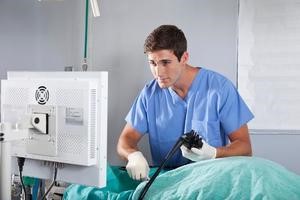 The American Society for Gastrointestinal Endoscopy recently released guidelines for infection control during GI endoscopy and related procedures. The guidelines come at a time when reports of endoscope-related infections are becoming more prevalent in the media. While the overall incidences of such infections are rarely reported, there is a strong possibility of underreporting of adverse events due to subclinical illnesses or instances where infections are incorrectly attributed to other procedures or causes.
The American Society for Gastrointestinal Endoscopy recently released guidelines for infection control during GI endoscopy and related procedures. The guidelines come at a time when reports of endoscope-related infections are becoming more prevalent in the media. While the overall incidences of such infections are rarely reported, there is a strong possibility of underreporting of adverse events due to subclinical illnesses or instances where infections are incorrectly attributed to other procedures or causes.
The new guidelines point out that many of the issues related to endoscope-related infections can be traced back to avoidable causes such as poorly followed practices or defective equipment. In response, the ASGE Quality Assurance in Endoscopy Committee based the guidelines on the most current studies and well-informed opinions from a broad array of experts. As this article by Alex Young at Healio reports:
“Several recent reports of infections with multi-drug resistant organisms associated with duodenoscope use suggest that prior assumptions regarding endoscopy-related infection rates may be an underestimate, particularly for [endoscopic retrograde cholangiopancreatography],” the guideline authors wrote. “These outbreaks of infection have led to a reassessment of current infection control practices.”
The following is a summary of the ASGE Quality Assurance in Endoscopy Committee’s recommendations:
-
Follow all federal and professional organization requirements that require high-level disinfection of endoscopes.
-
Ensure proper disinfection of duodenoscope elevator mechanism and wire channel to prevent the spread of highly resistant organisms.
-
All staff involved in endoscope reprocessing need extensive training on infection control, and documentation is required for the training.
-
Staff should be assessed at least annually for reprocessing efficacy.
-
If there is a reprocessing failure, the patients, infection control personnel and the device manufacturer, as well as any relevant local, state and federal health agencies should be notified immediately.
-
General infection control principles should be adopted by the endoscopy unit.
-
Endoscopy units must have a qualified person to direct their infection prevention plans.”
Read the entire article here: ASGE issues new guidelines for infection control in GI endoscopy
The infection risk with endoscopes continues to be a major worry for hospitals and their patients. As the ASGE points out, hospitals must ensure staff are trained on general infection control principles and must adhere to reprocessing best practices. To ensure that your staff is following reprocessing best practices on every scope they disinfect, think about installing additional checks and balances into your workflow so that you can document that the staff is following the same process each time. Endoscope tracking systems such as iRIScope have been introduced in recent years to help hospitals ensure that each of their flexible endoscopes is reprocessed the proper way each time, and documentation of their reprocessing is kept electronically using advanced RFID technology.
